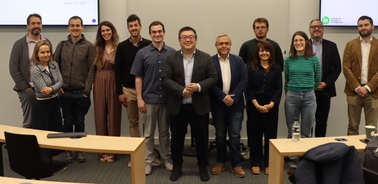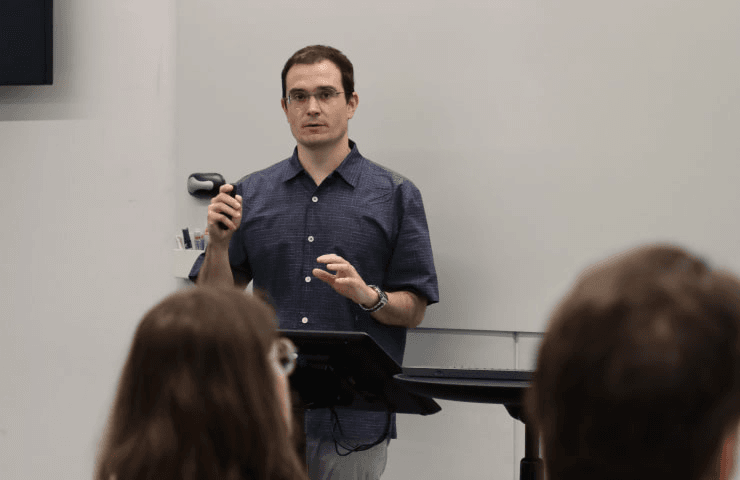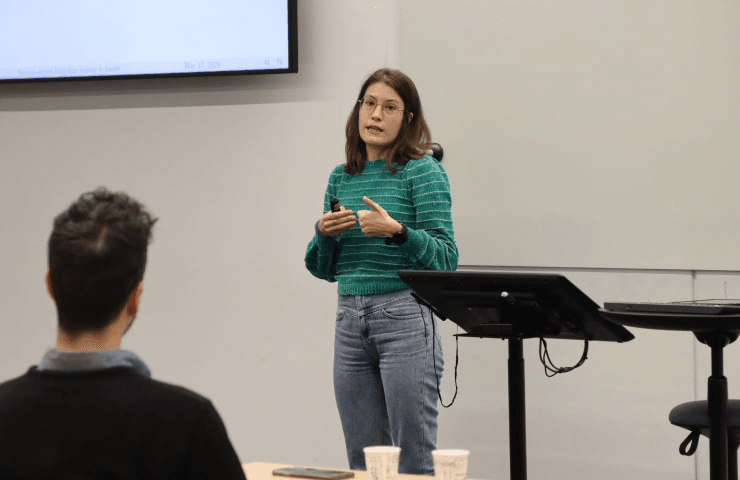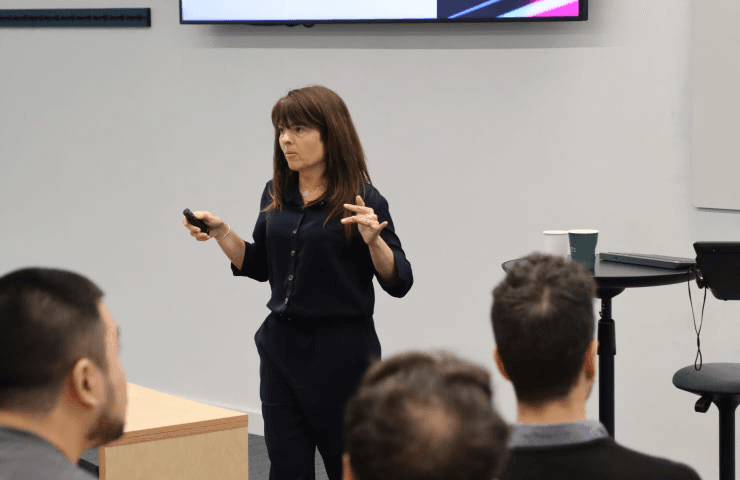IE University and Real Sociedad Matemática Española Collaborate on AI and Healthcare Workshop

The one-day workshop brought together top researchers in the field.
IE University and Real Sociedad Matemática Española (RSME) spearheaded a workshop on AI and healthcare, bringing together top researchers to discuss probabilistic machine learning, ethics, as well as successful use cases of data and AI in the sector.
Held at the IE Tower, the workshop aligned with the Impact Xcelerator’s Health and Data Lab objectives at IE School of Science and Technology, promoting research and projects aimed at improving people’s quality of life. It was organized by IE Professor Dae-Jin Lee and supported by the Bachelor in Applied Mathematics, Spanish Ministry of Science and Innovation (MICINN) and the Spanish Research Agency AEI/FEDER, and the EU through the “S3M1P4R” PID2020-115882RB-I00 project.
Iñigo Urteaga, Research Fellow at Basque Center for Applied Mathematics led the session on Probabilistic Machine Learning for Predictive Models in Healthcare using his research on menstrual tracking apps as a case study.
“In the last four or five years, there has been a lot of work both in the industry and research on how we can leverage this data to learn more about menstruation, but also help the users,” he said. “Because at the end of the day, the user of the app wants to understand how the process is evolving over time, understand when the events of interest [such as ovulation and menstruation] happen.”
Urteaga said the apps’ largest potential lies in using the collected data to help in non-clinical detection of gynecological diseases like polycystic ovaries syndrome (PCOS) and endometriosis.
However, with the number of days between one menstrual period and another as the only piece of data Urteaga received for his research, he struggled to decipher the reason for users’ large variability in cycle length – they either failed to report back to the app or had abnormally long cycles as per medical standards.
“I was expecting that menstruation is 28 days, maybe 29, 30, but when I plotted a histogram, I saw huge variability,” he said. “My first idea was obviously everybody here missed reporting it, but then they told me, no, no, you don’t know anything about menstruation – these things can happen. So then the question is how do we tell them apart?”
The solution would be complementing the data with other factors such as medication, mental health, exercise, and most importantly whether users open the trackers – signaling that they could be ignoring the apps’ notifications, according to Urteaga.
In the second session, Victor Aceña and Carmen Lancho, Data Scientists from Universidad Rey Juan Carlos shared success stories from using data science and AI in health.
Each of the scientists presented three cases, including Pixelab’s smart beds enhancing sleep, SpikaTech’s holographic and non-invasive visualizations for diagnosing and preventing heart problems, along with RNFC’s predictive models for patients’ walking ability after hip fractures.
Following that session, Raquel Iniesta, Researcher in Machine Learning and Ethics of AI for Precision Medicine at King’s College London brought her expertise into the workshop.
Iniesta said the field’s ethical dilemma boils down to three central stakeholders – doctors worrying about AI replacing their jobs, patients’ skepticism towards machines, and developers questioning their own algorithms’ medical safety.
She emphasized that assessing AI’s ethical risks requires adherence to the four principles of biomedical ethics: beneficence, nonmaleficence, autonomy, and justice – with clinicians remaining accountable for medical decisions and using AI only as assistants, ensuring that patients are educated about the machines’ specific roles in their treatment and placing them in the center of decision-making.
“It's important that all our understanding of the ethical challenges relate to the patient centered care, and the evidence-based medicine, this is where we are at the moment,” she explained. “The patient is at the center of any medical decision. If anybody will have a machine review his symptoms, the patient should still be the center, I cannot forget about the patient because of the data.”
The workshop concluded with a roundtable discussion between the speakers on Ethics and Practical Applications of Medical AI, moderated by Dae Jin Lee, Chief Scientist of the Impact Xcelerator Health and Tech Lab.
Antonio García, professor of the Disrupting Healthcare course at IE Business School also joined and talked about the sector’s corruption, stressing that AI could help in combating its challenges.
“Healthcare is a sector that works really bad, there’s corruption, there’s fraud, there’s abuse. For example, in the USA there are gangsters – banned from different countries, they have created fake hospitals, and they are billing lots of claims into the CMS [Centers for Medicare and Medicaid Services],” he said. “A way to solve this problem is by using AI, if you are able to create an algorithm that tells the CMS be aware that could be a fake claim, you are helping them.”
Healthcare remains to be a primary research area for the IE Impact Xcelerator. Last semester, Hamad Bin Khalifa University joined the Impact Xcelerator to organize the Healthcare and Technology Collider, discussing potential research and investment opportunities in the sector such as telemedicine, metaverse twins, and genomics.


